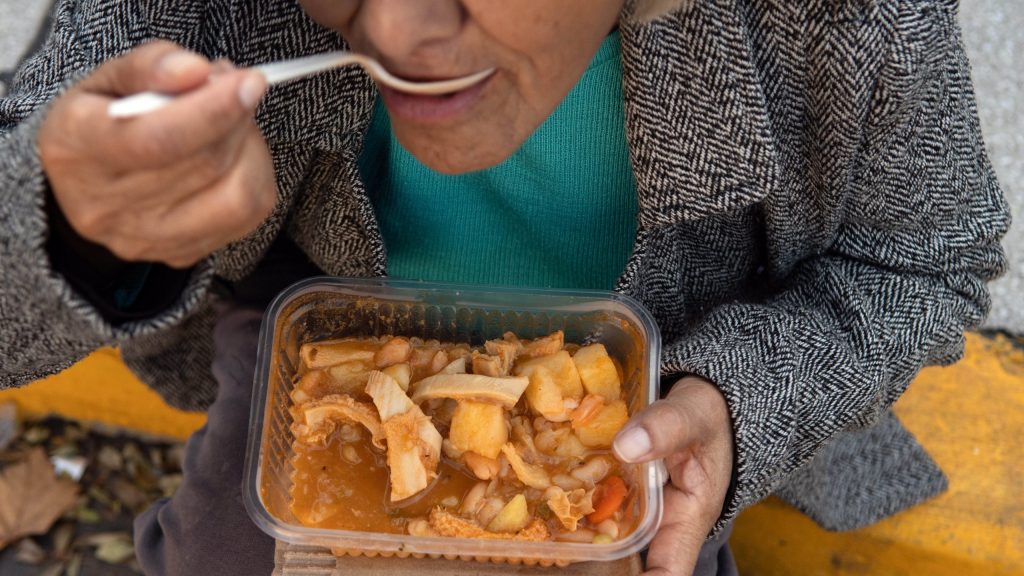The important and urgent task of feeding the world must follow ethical guidelines and respect cultures, traditions and biodiversity, said the head of the Pontifical Academy for Life.
"We have to feed everyone, but not everyone has to eat the same thing," Archbishop Vincenzo Paglia, academy president, said from the Vatican during an online conference Sept. 24.
Protecting the biodiversity of crops, animals and humanity "is a central task and must be part of the whole food process," following ethical approaches every step of the way, even at the risk of making the processes more difficult or subjected to change, he said.
"Basically, we have to avoid letting technology be complicit in reducing food to a simply physiological fuel. The dinner table is a cultural treasure, a part of our lives, with its own traditions and rewards that need to be kept safe and multiplied," he said.
Archbishop Paglia was speaking at a virtual conference titled, "AI, Food for All: Dialogue and Experiences." The meeting was a follow-up to a Feb. 28 event held at the Vatican that included the signing of a "Call for AI Ethics" by the leaders of the papal academy, Microsoft, IBM and the U.N. Food and Agriculture Organization.
The same signatories attended and spoke at the Sept. 24 meeting, designed to promote inclusive, transparent and ethical ways to use digital technologies and artificial intelligence in achieving sustainable agriculture, food security and adequate nutrition for everyone now and in the future.
At present, more than 2 billion of the world's 7.5 billion people do not have consistent access to safe, nutritious and sufficient food, according to the FAO. And it's estimated that the world population will reach almost 10 billion by 2050.
"Three decades from now, we will need 50% more food" and 50% less carbon emissions, as part of mitigating climate change and conserving natural resources, Brad Smith, president of Microsoft, said in his talk.
That will require huge improvements in sustainable agriculture, including better water and soil management, he said, which means getting "all the help we can get" through increased cooperation among industries and organizations.
AI should be used in ways that "can augment human intelligence and capability," and technology must be accessible to everyone; "if not, there will be a worse divide" than there is now, Smith said.
John Kelly III, executive vice president of IBM, said in his presentation that he has seen the COVID-19 pandemic, not as a setback, "but as an opportunity to accelerate" the implementation of the principles he endorsed in February.
He said AI could best serve in providing data and devising strategies for producing food locally where it is most needed, getting food to where it is most needed and for predicting and circumventing problems that would disrupt the distribution of food supplies.
He said about $1 trillion worth of food is lost or wasted every year, for example, when it gets delayed at a port or because of natural disasters, and an "ethical AI can solve this, too."
Qu Dongyu, director-general of the FAO, said "transforming our food systems requires innovative solutions to ensure food security and nutrition for all."
The FAO, he said, was working on creating an international, "inclusive multi-stakeholder forum for identifying and discussing the potential benefits and risks of the digitalization of the food and agricultural sectors."
For this reason, the FAO would "really appreciate and expect colleagues from the AI and the digital giants to offer us assistance, cooperation and engagement to help the (FAO) member countries and the farmers" in the development and distribution of ethical technologies, he said.
Archbishop Paglia said, "It is increasingly clear that different fields of knowledge and different skills must find common spaces, places to share and compare, opportunities for mutual support," which includes industries, NGOs and individuals or sectors normally left out of the conversation.
"The scientific hyperspecialization that characterizes contemporary research, the cultural predominance of economics, the marginalization of any humanistic reflection, all create a serious risk that we'll lose sight of our goal and accept answers that do not respect the dignity of human life," he said.
By building bridges and getting "the humanities and high tech" together, he said, there can be the needed discussion and responses to the real challenges that ethics pose to everyone.
"We must reflect and intervene, each according to his or her own responsibilities, so that the obvious, but not inescapable, connection between new technologies and power structures is not all-powerful in its ability to control and manipulate markets and democracies at the global level," Archbishop Paglia said.
"We must reflect and work together," he said, "to ensure that the undeniable influence of the digital industry does not lessen freedom of choice and always remains within democracy's mainstream."

